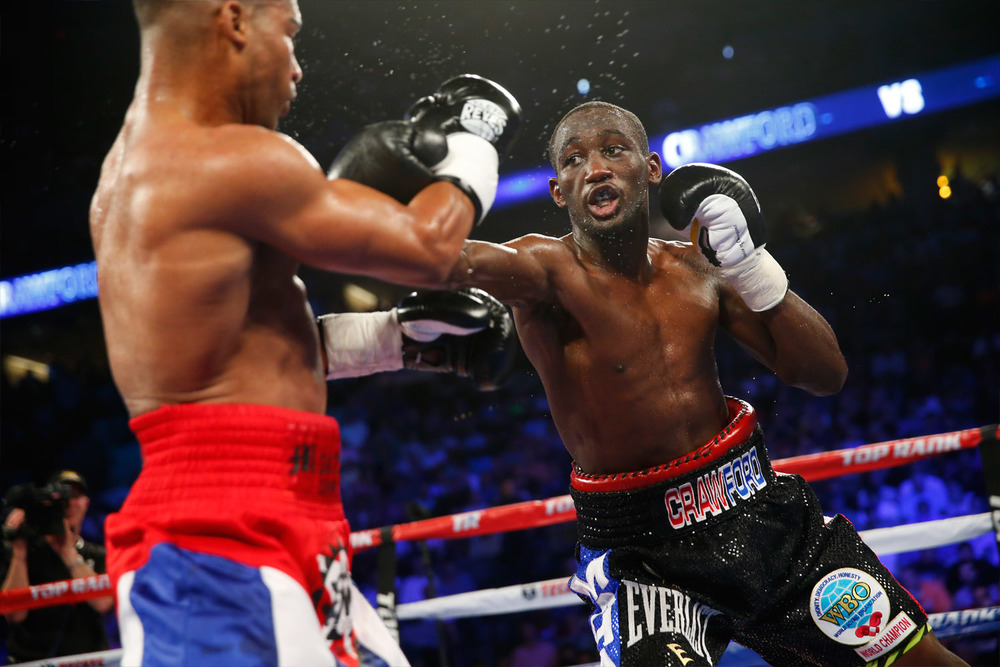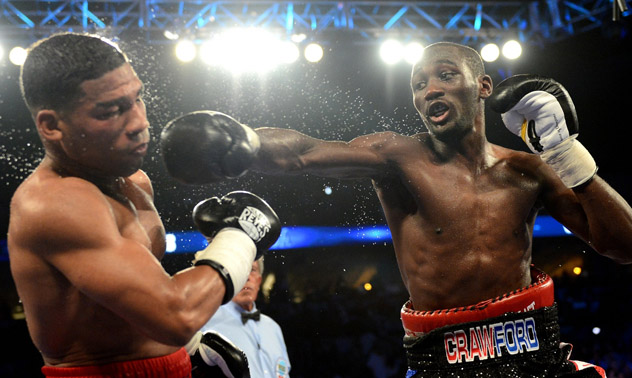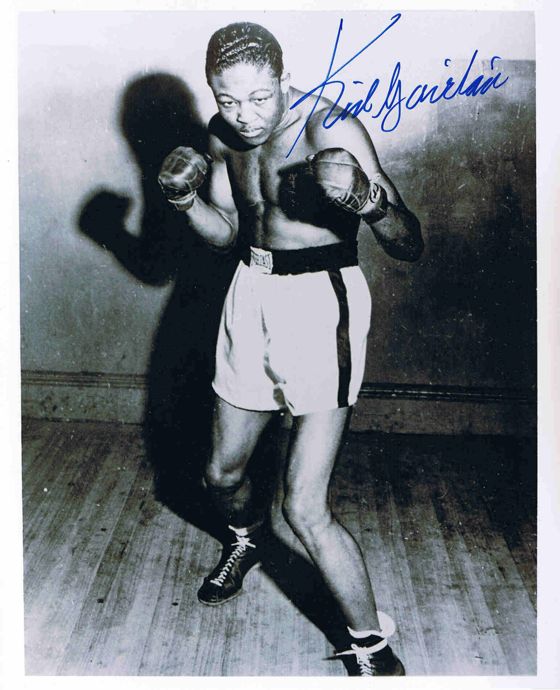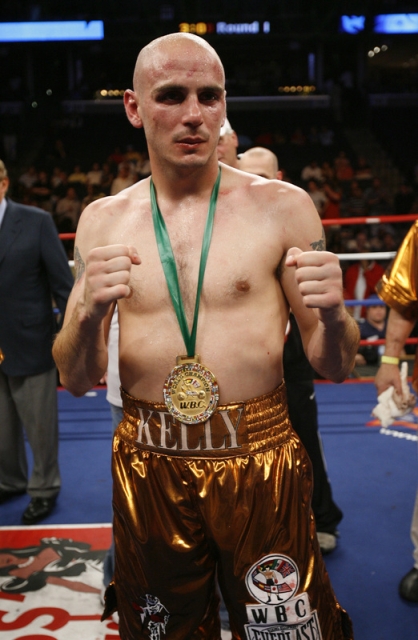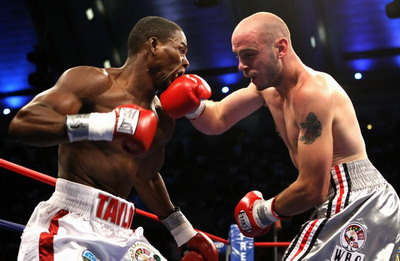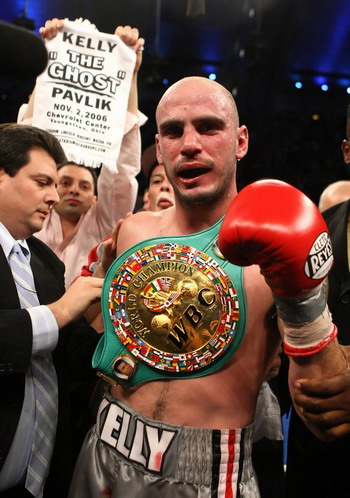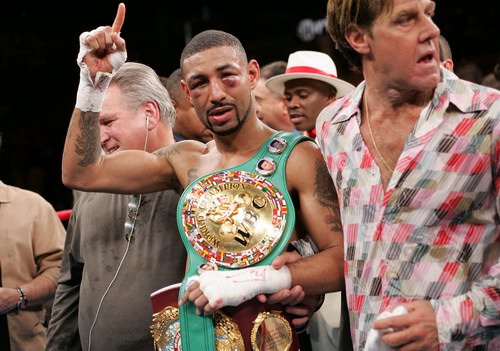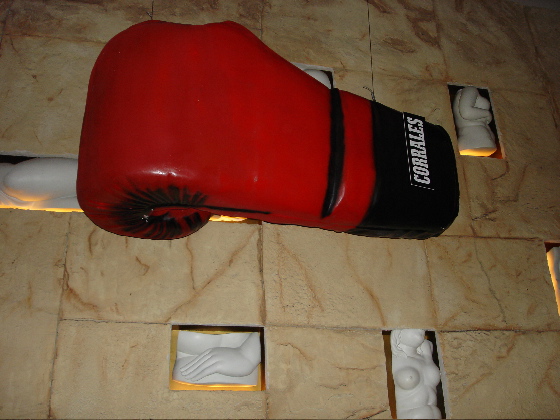
[Above, promotional decor for the first Corrales-Castillo fight outside the restaurant Aureole at Mandalay Bay.]
CORRALES-CASTILLO
8 May 2005
They're already calling it a classic, one for the ages, the fight of
the year — a year which isn't even half over and which has also seen
the recent epic combat between Morales and Pacquiao.
If you're a member of the Fancy you know I'm talking about the awesome
battle between Diego Corrales and Jose Luis Castillo at the Mandalay
Bay Events Center in Las Vegas last night. If you're not, take a look
at a rebroadcast or tape of the fight sometime and try to believe your
eyes. I was there, and I still don't believe mine.
There were some goofy undercard fights which did not prepare one for
what was to come — but looking at the faces of Corrales and Castillo
on the big video screens as they made their ways to the ring one could
see that the mood of the night was about to shift. These guys had the
air of men facing something terrible but inevitable.
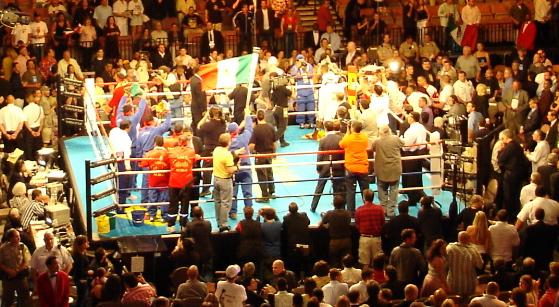
Castillo is a fighter who doesn't move exceptionally well on his feet
or punch exceptionally hard, but he's a skillful enough boxer. He likes
to go forward and pound away at an opponent and grind him down.
Corrales is taller and rangier, with more speed and a harder punch but
not known for his sturdiness. Like many rangy fighters he can't always
absorb punishment well and has been knocked down, though not out, a
lot. Both men have awesome wills, though, and never give up, so the
fight did not figure to go the distance.
My sense of it was this — either Corrales would knock Castillo out
sometime in the first four rounds, or Castillo, if he survived the
early going, would knock Corrales out sometime in the last four rounds.
Beyond that, prediction would be foolish.
In the end it went much (though not quite) as I had foreseen, but on a level no one could have imagined.
Corrales did indeed dominate the early rounds, but just barely. He hit
Castillo repeatedly with combinations that would have felled a lesser
man — and almost felled Castillo. But Castillo gave almost as good as
he got and the rounds were very close.
When the fourth ended, I thought — now Castillo's time has come . . . now he will win.
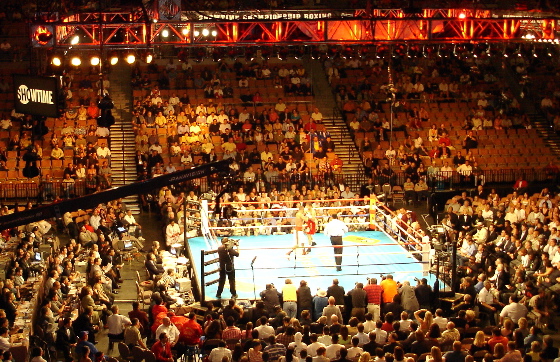
But the balance never tipped too far in either direction and as the
battle wore on I was gripped by a strong feeling of sadness at the
thought that someone was going to lose this fight. It had become a
battle of wills, a contest on a moral and spiritual plane. By the 8th
round I had a feeling that Corrales had the edge. He seemed to be
landing the harder blows and he seemed, surprisingly, fresher. But that
just made Castillo's refusal to surrender all the more admirable.
Still, moral determination can take you only so far — in the end the
body has its limits. But anyone who watched this fight now knows that
those limits are sometimes wider than the mind can easily conceive.
In the 8th Castillo made a startling comeback, fighting it seemed on
willpower alone. He opened a cut under one of Corrales's eyes and
nearly closed both of them. By this point both men seemed to have
abandoned defense altogether, willing to take any amount of punishment
to find the opening that would end things decisively.
And then, in the 10th, it happened — exactly as I had predicted.
Castillo landed a combination that put Corrales down. He got up to
continue but he looked dazed and unsteady on his feet. The crowd, which
heavily favored Castillo — Las Vegas boxing fans are overwhelmingly
pro-Mexican, and Corrales was a mere American — had been roaring
incoherently throughout the fight. The roar turned mournful in the
middle rounds, with an undertone of shock and anger. Now it soared into
the realms of delirium.
A guy behind me screamed, “It's over!” — and I agreed with him.
Corrales's destruction was now just a matter of time, and not much time
at that. Castillo struck with more combinations and Corrales went down
again. Somehow he got up on all fours and then up on his feet to beat
the count, but he looked like he was somewhere else, far from Las Vegas
and this ugly beating he was getting.
Both times he went down Corrales lost his mouthpiece — by crafty
design or simply from punch drunkenness. Fighters who are ready to give
up often spit out their mouthpieces in unconscious anticipation of
surrender. In any case, retrieving the mouthpiece and getting it put
back in by his cornermen gave Corrales a few extra seconds to get his
head together and his legs coordinated.
Referee Tony Weeks, a seasoned veteran, seemed to take his time
transferring the mouthpiece to Corrales's seconds — I had a feeling he
was giving them a chance to stop the fight, because Corrales looked on
the verge of absorbing some vicious and possibly debilitating further
punishment. But Joe Goosen, Corrales's trainer, obviously had no
intention of throwing in the towel. Indeed, after the second knockdown
he gave his fighter a stern and admonitory look — as though trying to
convey to him the gravity of the situation. Goosen appeared serious but
oddly calm — which may have had some influence on what happened next.
The fight resumed. Corrales didn't yet seem to be all there, but his
dislocation from reality took an astonishing form. He stood up
straight, with no attempt at defense, and attacked Castillo fearlessly.
There was no time to tie up and regroup — he'd lost three points in
the 10th, two from the knockdowns and one from Weeks, who had penalized
him, quite correctly, for spitting out his mouthpiece the second time.
At times in the middle rounds I'd had a sense watching Castillo of
seeing a ghost in action. Physically beaten, he was operating by pure
will, transcending the physical. Now Corrales seemed to have entered
the same disembodied territory. His body was beaten — something else
was fighting in the ring in its place.
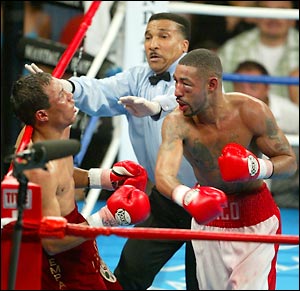
[AP Photo]
He hit Castillo with a punch that stunned him, sent him back into the
ropes. He hit him again four times as he leaned against the ropes, his
hands down, his eyes rolling upwards, out on his feet. Weeks called an
end to the fight to prevent certain permanent damage to Castillo and
possibly his death.
Corrales had come back from the dead and was now champion. Castillo,
who'd had the fight won in merely mortal terms, had lost. I discovered,
when my mind settled a bit, that my mouth was wide open and that I was
holding my head in my hands — a perfect cartoon-figure expression of
shock.
The cry from the crowd was indescribable — filled with sorrow and
astonishment and an almost inhuman excitement. The place seemed
suddenly crowded to the rafters, bursting its seams — a case of
emotional standing-room only.
At the end of the night, Steve Albert and Jim Gray, the Showtime
announcers, made their way past me out of the arena. Someone shouted
something to Gray, who turned back and said, “You'll never see a better
fight than that.”
I'm sure I never will. Joe Goosen, when asked about the possibility of
a rematch, on everyone's mind after such a contest, said, “These two
should never fight each other again — it's too much.” They will, of
course, boxing economics being what they are — but it's hard to
imagine any other outcome than one of them killing the other in the
bout.
I went over to RM Seafood, an ultra-moderne restaurant at the Mandalay
Bay, for some soothing crabcakes and beer. I couldn't think about the
fight — there didn't seem much to think about. All its meaning had
been fully explicated and exhausted in the ring. What remained for me
was a kind of wonder, an expanded sense of the horizons of the human
will.

